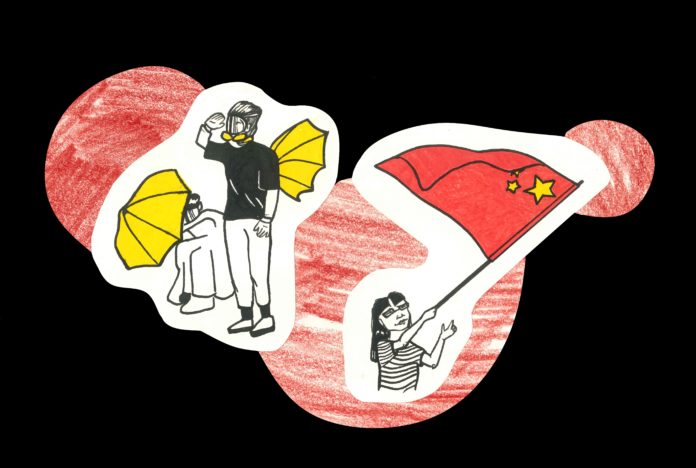I couldn’t help being exposed to the fact-blurring Chinese media coverage on the Hong Kong (HK) protests when I was in China over the summer. After my friend had castigated me for my plan to visit the naval base of the People’s Liberation Army (PLA) HK Garrison on their annual open house June 29, I finally turned to the American media. My friend said I was either brainwashed by the party ideology or ignorant about the political situation in HK. After the initial thrill of reading American coverage of HK protests, moving away from Chinese media, I eventually grew tired. The repeated reports of HK police brutality, violent protesters and cries of democracy and freedom from the protesters reinforced the repressive image of China and the valorous freedom-loving HK protesters. It didn’t provide me with the holistic picture I expected. Despite its extensive and detailed sourcing, American coverage was disturbing in how narrow-minded it could be.
The storybook-like picture American media paints is appealing: the manipulative power-craving Chinese “regime” obstructs the suffering HK citizens’ path to the ultimate good of democracy. This binary logic can make unscrupulous readers easily conclude that China mistreats HK and they need to support its people’s struggle for democracy. It is obvious who wins your empathy.
I am not here to attack or judge this democratic ideal, but I question if this is what HK protesters actually seek. Although both Chinese and American media have homogenized the diverse population within HK protesters, there have been different groups varying in goals: separatists want HK independence, some desire democratic universal suffrage, some request independent investigation on the police and some want a place to let off some steam (according to a currently censored analytical account of HK protests by Institute of Public Policy South China University of Technology). Only a few news analyses turn away from the political causes of the current protests and allude to the protesters’ variety of motivations.
It’s difficult to say that democracy is the ultimate reason for all these protests. Protesters may claim they want democracy as the solution to their immediate political discontent over the Extradition Bill and to more long-term and latent problems tracing back to the city’s colonial history. Slogans such as “Free Hong Kong, Democracy Now” could mean more than the city’s obvious political struggles. What the protesters allegedly demand could differ from what they want — or need.
The less apparent factors become clear when we consider HK’s economy. Compared to its mainland neighbor Shenzhen, an underdeveloped fish-catching village 30 years ago and China’s high-tech heartland today, HK’s economic development has been stagnant at best. Inequality has grown wider, housing prices have skyrocketed and youth find decreasing opportunities for social mobility. It’s convenient for people to draw an association between British colonial rule and the city’s previous economic prosperity. They see the West and its values as the solution to HK’s current development problems, despite Britain never giving the city any form of democracy — such as voting rights and self-governance. There were aspects of British rule beneficial to HK economic development, but we should be critical. HK’s current economic stalemate contributes to the current protests. Besides its partial ties to HK’s politics, it has fundamental historical roots in HK’s transition from a colony to a Special Administration Region of China. Economy and history have always been in the story. It’s never just democracy.
This isn’t to say American media representations of HK protests are untrue. They have been generally well-sourced, detailed and up-to-date, providing readers with more well-rounded and fact-based contexts, while Chinese news outlets have often failed. For example, reporter Fu Guohao of Global Times was beaten up by demonstrators in the Hong Kong International Airport Aug. 13. Mainstream Chinese media outlets used emotional language to herald Fu as a national hero headlining their stories with Fu’s heartening cry to those who tied him up, “I support Hong Kong police, you can hit me now.” By contrast, their American counterparts provided a more holistic account with more neutral language and took into consideration both sides of the story, following up with the reactions of the demonstrators, who later apologized. We should recognize the virtues of American news coverage and appreciate the insights that it offers but keep in mind what it has left out as well.
Democracy is only part of the HK story. News organizations should also provide alternative perspectives in both reporting and explaining the issue by analyzing HK’s colonial history to see the long-term precipitating factors leading up to the events today. As for us, the common readers — instead of readily accepting the news we have access to, we should always question if it is the full story. I will never be fully exempt from my friend’s criticism of ignorance, because I know there is always more to the story. At least I know now I am not brainwashed.
Kathy Ou is an undeclared sophomore. She can be reached kou@oxy.edu
![]()



































